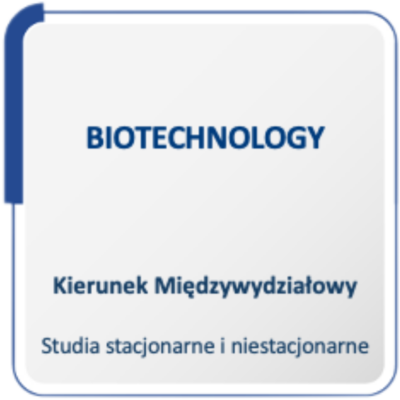- Opis
- Dodatkowe informacje
Opis
Biotechnology
| Mode of study | Title obtained | Study period | Language of instruction | Place of classes | Minimum number of credits (Polish students) | Admission Limit |
|---|---|---|---|---|---|---|
| Full-time | Bachelor of Science | 3,5 years/ 7 semesters |
English | Gliwice | 45 out of 150 max | 30 |
Place of classes:
GLIWICE
Faculty of Automatic Control, Electronics and Computer Science
Gliwice, 16 Akademicka St.
phone. 32 237 23 77
e-mail: air_waei_rekrutacja@polsl.pl
Faculty of Chemistry
Gliwice, 9 Marcina Strzody St.
phone. 32 237 15 74, 32 237 18 59
e-mail: wch_rekrutacja@polsl.pl
Faculty of Energy and Environmental Engineering
Gliwice, 18 Konarskiego St.
phone. 32 237 19 70
e-mail: wisie_rekrutacja@polsl.pl
Biotechnology is an interdisciplinary science that uses biological organisms on an industrial scale. What processes are we talking about? Biotechnological processes occur in different situations, e.g., in milk or beer production, sewage treatment, and nuclear medicine. As you can see, it is no exaggeration to say that it is a diverse science! We will teach you a comprehensive approach to biotechnology issues, looking at these processes from the point of view of bioinformatics and environmental and industrial biotechnology, including pharmaceuticals. You will gain theoretical knowledge and practical work on issues in broadly understood biotechnology, biochemistry, microbiology, chemistry, analytics and computer science. You will learn about modern trends in pharmaceutical biotechnology, bioinformatics, bioeconomy and environmental protection.
Specialists in bioinformatics, environmental protection and biochemistry conduct this interdisciplinary field of study. You will find that biotechnology is used in various industries, such as agriculture, medicine, and environmental protection. Our task is to prepare you to work in industry, bioinformatics centres, and diagnostic laboratories. You will learn how to use large databases, design bioprocesses and bioproducts and implement a sustainable development strategy, which is the most important direction of the modern economy. As a student, you will pursue your scientific passions because we know how exciting biotechnology is!
By studying Biotechnology, you will gain knowledge, skills and competencies in the following areas:
– basics of biology, chemistry, biochemistry, computer science
– conducting experiments using genetic engineering methods
– designing new IT tools, e.g. used in the analysis of biomedical data
– creating databases using artificial intelligence and machine learning tools,
– biotechnological processes and biotransformation,
– design and analysis of biologically active compounds
– solving engineering tasks related to biotechnology of sewage/soil/air purification
– methods of recovering energy and valuable substances/raw materials from sewage and waste.
Our students gain knowledge within the university and with partners from the socio-economic environment, completing mandatory and additional internships. The natural continuation of these internships is often employment after graduation. They can also intern abroad as part of international exchange programs. It all depends on you, and we will gladly help you!
The demand for specialists in the field of Biotechnology is growing every year. A good biotechnologist must have extensive knowledge, so you will gain it and thus find the job of your dreams more easily. You can deal with, among others, genetic research, medical diagnostics, analysis of large data sets (big data), modelling, conducting and analysis of biotechnological processes and biotransformations.
As a graduate, you have an open door to a professional career in:
- clinics and medical centres
- bioinformatics and IT centres
- environmental protection and circular economy
- laboratories, research institutions
- food, pharmaceutical and chemical industries.
Mateusz (specialization: Biotechnology in environmental protection):
What is valuable about our course is that it prepares you to work in many fields or work in various types of laboratories. In my case, I use the knowledge in the field of sewage treatment that I gained during my studies every day because I work as a technologist at a sewage treatment plant.
Aneta (Bioinformatics specialization):
Thanks to the wide range of activities, I learned a lot and quickly found a job in a profession I enjoy. Working for one of the largest pharmaceutical companies, I use the knowledge acquired during my studies and constantly develop myself.
Patryk (specialization: Industrial Biotechnology):
Studying this field was the perfect decision. Thanks to the interdisciplinary knowledge I acquired and the opportunity to apply it in practice during classes or participate in a wide range of scientific projects, I could easily find my dream job.
Graduates know the fields of microbiology, genetics, molecular biology, biochemistry, bioinformatics, computer science, physics with biophysics and chemistry. They were introduced to aspects of reactor engineering, mass and heat transport, biocatalysis and biotransformation processes, genetic engineering, and modern methods of analysing chemical compounds and biological samples. Thanks to the knowledge of intelligent data analysis techniques, they can process large data sets in biomedical applications. They can apply techniques enabling the selection and modification of microorganisms and cells of higher organisms, as well as design and operate engineering facilities for environmental protection, such as sewage treatment plants, biogas plants and biorefineries. Biotechnology graduates find employment in specialized laboratories, research institutes, medical centres, food, pharmaceutical, chemical, environmental protection and circular economy, bioinformatics and IT centres. They can work in institutions dealing with genetic research, medical diagnostics and analysis of large data sets (big data), conducting biosynthesis and biotransformation processes, obtaining bioproducts, and modelling bioprocesses.
Dodatkowe informacje
| Tytuł | inżynier |
|---|---|
| Stopien | Stopień I |
| Forma | Stacjonarne |
| Język | Angielski |
| Kierunek | Biotechnologia |
| Miasto | Gliwice |
| Profil | ogólnoakademicki |
| Rekrutacja | Letnia |
| Wydział | Wydział Automatyki, Elektroniki i Informatyki, Wydział Chemiczny, Wydział Inżynierii Środowiska i Energetyki |





